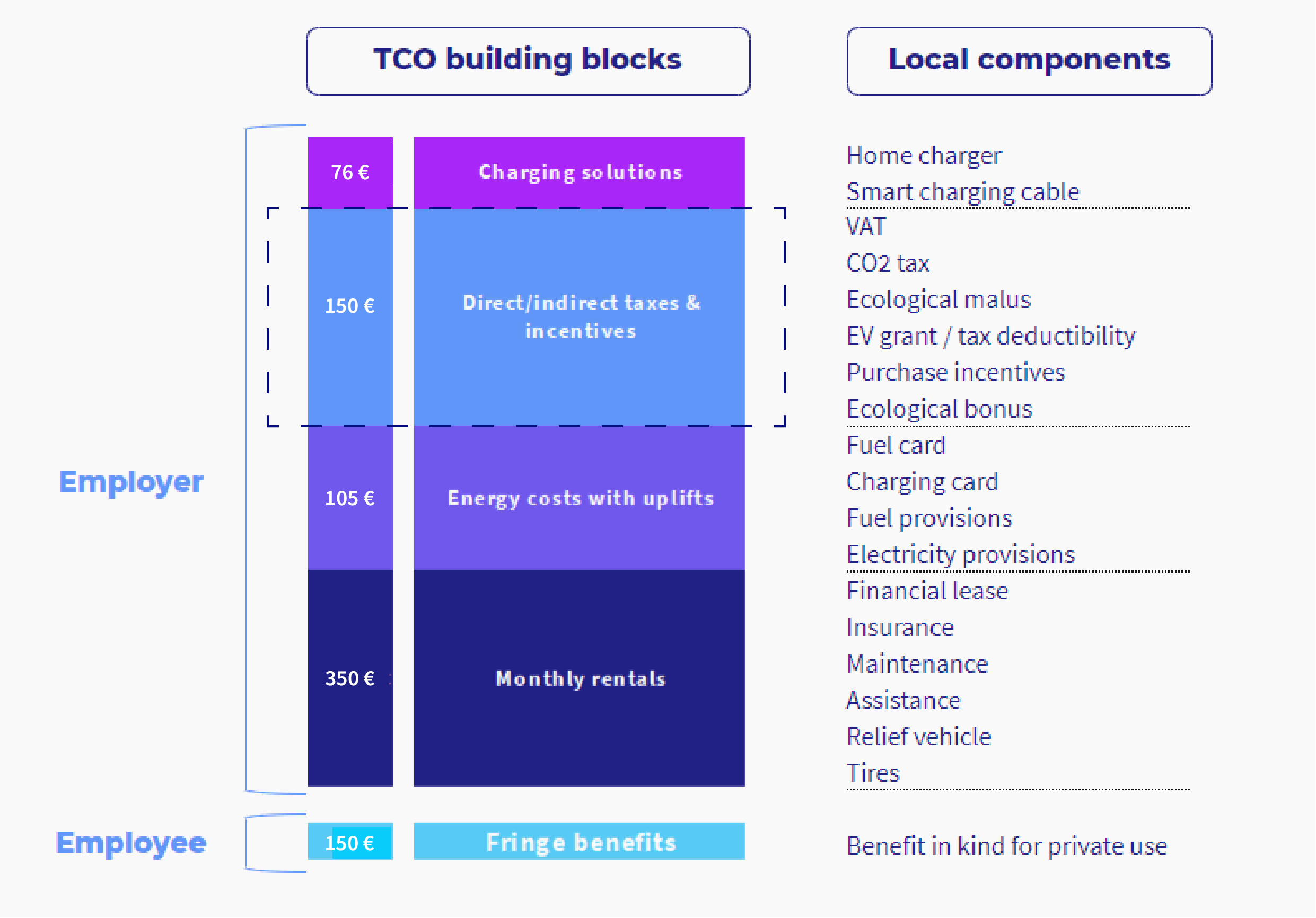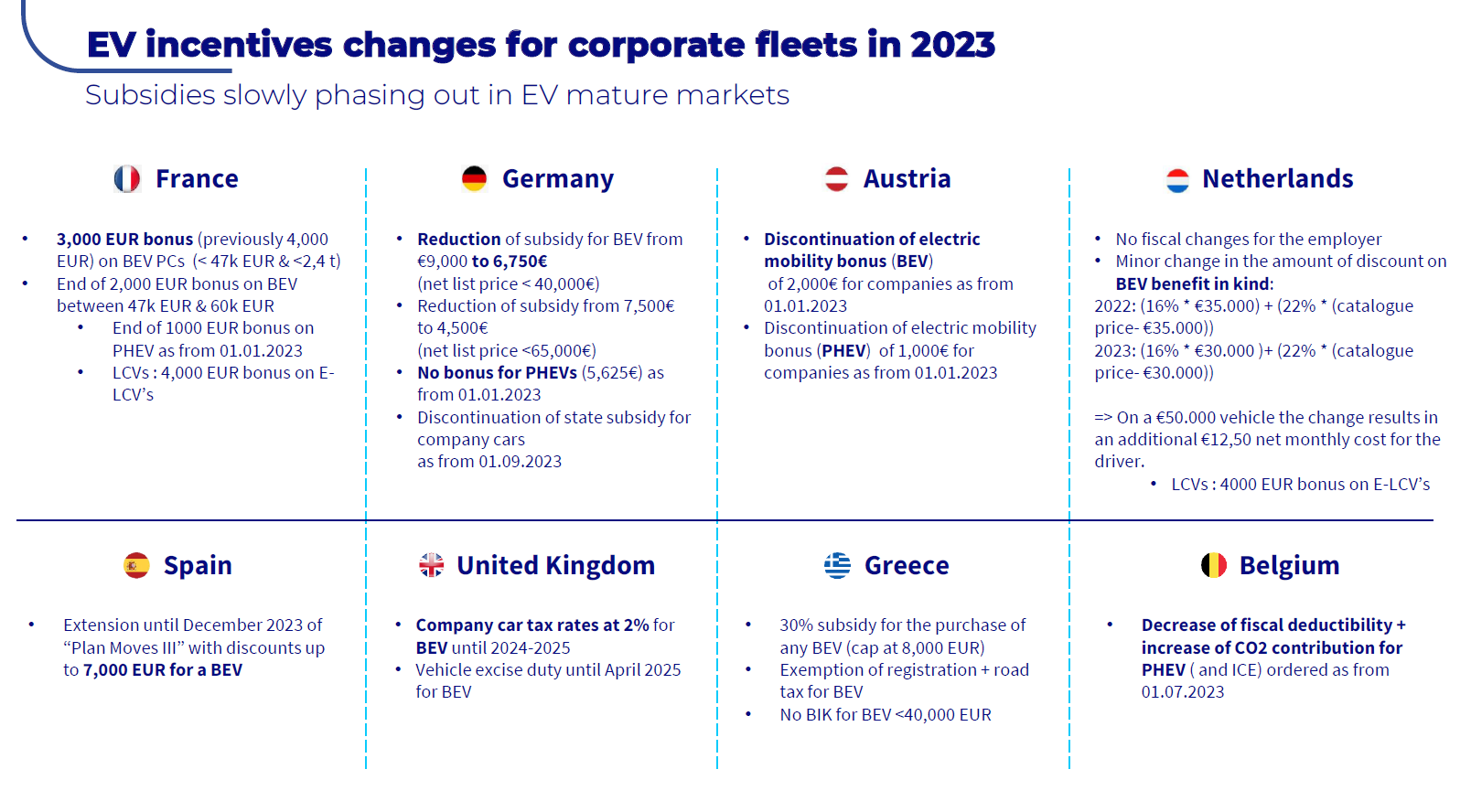Navigating the Bumpy Road of car Taxation in Europe
The building blocks of TCO
First, let's take a closer look at the foundational elements of TCO. As the graphic below shows, along with depreciation, maintenance, and fuel expenses, taxation is among the key factors that make up TCO. While all these components are important, taxation holds particular importance due to its potential to significantly impact the budget. For more insights on the other building blocks of TCO and its optimisation, see here.

Navigating your way round different countries
Navigating taxation laws across different countries can be a daunting task for fleet managers. How can you keep up with all the different changes and ensure you are well-positioned to adapt?
It’s a story of carrots and sticks – some governments incentivise the purchase and usage of electric vehicles (EVs) while others impose punitive taxes on internal combustion engine (ICE) vehicles. In order to understand who is doing what, one strategy is to group countries together based on their level of development. In mature markets, where demand for EVs has already reached a critical mass and organic demand is still on the up, the reduction in tax incentives has had little impact on the number of EVs on the road. In these cases, the momentum towards electrification remains strong, driven by a desire to reduce carbon emissions. One example of this is the UK, where the adoption of EVs continues to grow. On the other hand, less mature markets like Greece and Spain have yet to reach that tipping point, and their governments are therefore more inclined to maintain favourable taxation policies, i.e. handing out the carrots. It’s vital to be aware of these country-specific nuances to effectively navigate the complex world of international taxation.
In the case of plug-in hybrid electric vehicles (PHEVs), it's essential to note that mature countries are currently offering fewer incentives, while less mature countries continue to provide them. Belgium is a case in point, given its clear ordering deadline (before the 1st of July) to benefit from tax incentives. You can explore similar options in your own country to optimise your TCO.

In the UK, the organic demand for EVs remains robust, despite the end of purchase subsidies for passenger cars in July 2022. The BEV market share has doubled from 16% in March 2022 to almost 32% in December 2022 indicating that the adoption S-curve has passed the tipping point for the UK, as seen in other mature markets such as Norway and the Netherlands. For countries like France, Germany, and Austria, where governments are phasing out purchase subsidies, we anticipate that the tipping point will be reached shortly. Meanwhile, in Belgium, fleet managers can benefit from a 100% tax deduction when ordering an EV before the 1st of July, making it a highly incentivized option worth considering. As we have seen above, direct and indirect taxation can impact TCO by up to 30%, making it crucial for fleet managers to stay up-to-date with the evolving tax landscape.
So what can fleet managers expect? A decrease in BEVs production prices and lower energy costs
Despite the evolving taxation landscape, EVs, and particularly battery electric vehicles (BEVs), continue to offer a cost-effective solution for fleet managers. This trend is driven by the increasing investments of car manufacturers in EVs and their ongoing efforts to reduce production costs. Even with fewer bonuses, subsidies, and changes in taxation, EVs remain the most viable and efficient option in the long run. Moreover, regulatory bodies and car manufacturers are continuing to push for electrification, cementing it as the best long-term strategy for fleet managers.
Depending on where EVs are charged (at home, in the office, or on the road), price increases can affect the budget, but charging at home or at the office is still cheaper than refuelling. Although electricity is more expensive to produce than petrol, governments are more incentivized to reduce the impact of energy inflation on individuals and corporations and ease the ongoing energy transition. The trend is to push the usage of electricity and reduce dependence on petrol and diesel.
Help is at hand
To sum up, taxation is a critical factor that you must consider when budgeting for your fleet's TCO. However, despite the ever-changing taxation landscape, electrification is still the most cost-effective and sustainable solution. It is possible to cluster countries based on their maturity level and explore specific cases like Belgium to make informed decisions for your fleet.
For personalised and data-based insights, ALD Automotive’s Consultancy team is here to guide you to reach your goals. Our experts will help you steer through the complex world of taxation and electrification to optimize your fleet's TCO and avoid any roadblocks.